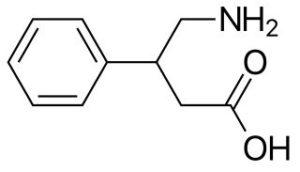Table of Contents
Key Takeaways
- Phenibut is a GABA analogue that increases GABA levels in the brain, providing stress relief and reducing anxiety.
- It has been used in the treatment of neurological disorders such as PTSD, anxiety, depression, insomnia, and alcoholism.
- By raising GABA levels, Phenibut helps balance mood, promotes focus, relaxation, and positive mood, and counteracts irritability and restlessness.
- Phenibut should be used cautiously due to potential dependency, withdrawal symptoms, and adverse side effects.
- Phenibut dosage should start low at 200 – 300 mg per day, avoid alcohol or benzodiazepines, and purchase from reliable sources.
- In a hurry – click here to learn more about and buy Phenibut here: Cosmic Nootropic – Phenibut
Phenibut (β-Phenyl-GABA, β-phenyl-γ-aminobutyric acid, Noofen, Citrocard) is an analogue of the inhibitory neurotransmitter GABA. The addition of a phenyl ring allows Phenibut to cross the blood-brain barrier (BBB). Neurohackers prefer Phenibut when the goal is to raise GABA levels in the brain because GABA as dietary supplement cannot cross the BBB.

Phenibut was developed in St. Petersburg, Russia in 1963. And it has since been used as a pharmaceutical used to treat PTSD, anxiety, depression, insomnia, alcoholism and other neurological disorders.
GABA’s role is to keep glutamate, the primary excitatory neurotransmitter, from overwhelming you. Too much glutamate can cause a seizure, and too little (or too much) GABA can put you in a coma. A healthy brain maintains a critical balance of GABA and glutamate within the central nervous system.
GABA acts like a “brake” on neuron circuits during stress. Low GABA levels can result in anxiety, insomnia, poor mood and restlessness.
Clinical studies show that boosting GABA with a supplement like Phenibut relieves anxiety, stress, and boosts the production of alpha brain waves.[i] If GABA is optimized in your brain you’ll feel focused, relaxed and stress-free.
Phenibut helps:
- Balance mood. Phenibut has an inhibitory effect on overly stimulated neurons because it raises GABA levels in your brain. Low GABA levels lead to anxiety, depression and insomnia. GABA helps restore that balance. Promoting a more positive mood which improves focus and relaxation.[ii]
- Boost Human Growth Hormone. Bodybuilders and athletes use Phenibut before resistance training. Studies show by raising GABA levels, you can boost blood levels of Human Growth Hormone.[iii] Promoting greater recovery support and lean muscle growth.
- Neurotransmitters. Phenibut stimulates dopamine receptors, and antagonizes beta-phenethylamine (PEA).[iv] Dopamine aids in memory formation, attention, focus, and cognition. PEA increases the action of dopamine, norepinephrine, acetylcholine and serotonin. It’s partly behind the overstimulation that causes irritability, restlessness, and agitation that could be caused by too much dopamine and norepinephrine. Phenibut can counteract this affect giving you a cognition boost without the negatives.[v]
What is Phenibut?
Phenibut (β-Phenyl-GABA, β-phenyl-γ-aminobutyric acid, Noofen, Citrocard) is derived from the inhibitory neurotransmitter GABA. The addition of a phenyl ring allows Phenibut to cross the blood-brain barrier. And the reason why neurohackers prefer Phenibut when the goal is to raise GABA levels in the brain.

GABA (gamma-aminobutyric acid) is the major inhibitory or relaxing neurotransmitter in your brain.[vi] GABA’s primary role is to keep the major excitatory neurotransmitter glutamate in check.
GABA is naturally synthesized in your brain from glutamate. It’s estimated that 40% of the synapses in the human brain work with GABA and therefore have GABA receptors.
So when using Phenibut to boost GABA, you enhance normal sleep cycles, and improve blood pressure. GABA even stimulates the pituitary gland to secrete Human Growth Hormone. And helps produce endorphins that make you feel good after a workout or sex.
Soon after Phenibut was discovered in St. Petersburg, Russia, it was being prescribed by doctors to lower stress and anxiety, treat PTSD and insomnia.
Phenibut was included in the medical kit for Russian astronauts on the Soyuz-19 and Salyut-4 missions as a ‘tranquilizer’.[vii] Because Russian scientists found that Phenibut is one of the only tranquilizer and nootropic drug options that lowers stress levels without negatively affecting performance.
As a nootropic, when you use Phenibut to normalize GABA levels you’ll experience a reduction in anxiety, insomnia, nervousness, restlessness and stress.
Phenibut can be a more natural, safer alternative to Benzodiazepine drugs like Valium and Xanax. These pharmaceuticals work by increasing GABA receptor sensitivity.[viii]
How does Phenibut work in the Brain?
Phenibut helps brain health and function in several ways. But two in particular stand out.
- Phenibut boosts GABA in the brain. Phenibut is a derivative of GABA. And easily crosses the blood-brain barrier. GABA on its own cannot cross this barrier unless paired with a dedicated carrier.[ix]
GABA works by preventing neural signaling associated with anxiety from reaching other neurons. It does this by attaching to the receptors that would otherwise excite those neurons. Over-stimulating neurons in certain areas of your brain is what causes anxiety-related symptoms.
The majority of studies on Phenibut have been conducted in Russia. And most studies have been done with animals. In this study using rabbits, scientists looked at anxiety behaviors and how they were effected by Phenibut.
They exposed the rabbits to emotional stimuli causing anxiety in the animals. Anxiety caused the rabbits to ‘freeze’ and exhibit defensive reactions. Behaviors very similar to what happens in humans when they’re under stress.
When the rabbits were administered Phenibut, the anxiety-caused reactions of defensiveness and passive reactions (freezing) decreased to normal behavior.[x]
- GABA changes brain waves. Using Phenibut as a nootropic helps increase GABA levels in your brain. And we know that GABA helps decrease Beta brain waves and increase Alpha brain waves.[xi]
Beta brain waves are important for attention, alertness, concentration and developing memories. But excess levels of concentration, particularly during stress, can lead to anxiety, depression, insomnia and more stress.
When you are in an alert state, both Alpha and Beta brain waves can be stimulated. But the type of alertness will determine which brain wave is produced.
Alertness during an Alpha wave state is associated with a relaxed state. And a stressed alert state produces a Beta wave. But an excess of Beta brain waves contributes to a variety of nervous disorders including anxiety and stress.
Most of the clinical studies available done with humans use GABA supplementation rather than Phenibut. But the outcome of using GABA could be applied to using Phenibut to increase GABA levels in the brain. Phenibut crosses the blood-brain barrier more effectively than GABA.
In this study, researchers investigated using GABA on relaxation and immunity during stress in humans. They evaluated the effect on 13 subjects of GABA intake on brain waves.
An electroencephalogram (EEG) was used to measure brain waves after subjects took water only, GABA or L-Theanine. 60 minutes after administration, the study showed that GABA significantly increased Alpha waves and decreased Beta waves compared to water or L-Theanine.
The researchers concluded that raising brain levels of GABA induced relaxation and diminished anxiety.[xii] And you raise brain levels of GABA effectively when supplementing with Phenibut.
How things go bad if you are low in GABA
Low levels of GABA are associated with a variety of health problems.
↑ Anxiety[xiii], panic attacks, stress, PTSD, and insomnia
↑ Muscle spasms, hypertension, convulsion, Tourette’s Syndrome and epilepsy
↑ Dry skin and wrinkles
↑ Poor digestion, bloating, flatulence, and constipation
When your neurotransmitters, including GABA, are in balance, you feel motivated, productive and energetic. And you feel calm and relaxed during downtime.
When GABA levels are low you feel filled with dread, you’re constantly worried, you have racing thoughts, and you’re frequently late and disorganized.[xiv]
Many people in this GABA-slump resort to high carbohydrate foods, and drugs or alcohol to relax.
Phenibut benefits
 Phenibut is an analogue of GABA. The addition of a phenyl ring allows Phenibut to cross the blood-brain barrier much more easily than GABA taken as a supplement.
Phenibut is an analogue of GABA. The addition of a phenyl ring allows Phenibut to cross the blood-brain barrier much more easily than GABA taken as a supplement.
We need adequate GABA levels in our brain because it’s an inhibitory neurotransmitter. When we raise GABA levels by supplementing with Phenibut, we help keep glutamate in check.
Glutamate is your body’s most abundant excitatory neurotransmitter. Which is responsible for attention span, brain energy, learning ability, memory, and staying awake.
So GABA is calming and glutamate is stimulating. And they must be in balance with each other for optimal cognitive health.
An imbalance of these two neurotransmitters can cause fibromyalgia, chronic fatigue syndrome, poor memory and cognition, anxiety and depression.
But when these two neurotransmitters work together efficiently, you feel relaxed with no stress or feelings of anxiety. And you get a more restful night’s sleep.
Adding Phenibut to your nootropic stack can help bring GABA and glutamate back into balance.
How does Phenibut feel?
When you balance GABA levels in your brain, you feel relaxed and calm. But many neurohackers who try using GABA as a supplement don’t feel the effects. Because the GABA molecule is too large to cross the blood-brain barrier.[xv]
Note: If you do feel the calming effects of supplementing with synthetic GABA within a ½ hour of taking it, it may mean you have a “leaky” blood-brain barrier. Not a good thing.[xvi] Because if GABA can get through, all kinds of nasty stuff can get through too. Including toxins, undigested food particles and anything else in your blood stream that shouldn’t be in your brain.
See my article on how to fix a “leaky” blood-brain barrier here: How to Heal a Leaky Blood-Brain Barrier
But here were talking about increasing our GABA levels using Phenibut. Neurohackers report that adding Phenibut to their stack relieves anxiety, there is less stress and they feel more relaxed.
In fact, some say it’s the best anti-anxiety ‘medication’ they’ve ever used. Including some well known pharmaceuticals (i.e. Clonazepam, Diazepam, Alprazolam) used to treat anxiety. With none of the nasty side effects that come with prescription meds.
Social functions could get some help with Phenibut. You could feel less inhibited, speak freely and feel more confident.
Others report that Phenibut boosts sex drive, and for men it helps control ejaculation. And it helps for a better night’s sleep.
Athletes report that Phenibut goes well with a workout. Because Phenibut has been shown to boost Human Growth Hormone. You’ll be able to work out with less fatigue, energy levels will go up, muscles won’t be as sore and recovery could be faster.
Phenibut takes 2 – 4 hours before you begin to feel its effects. A strong word of caution: do not increase the dose or take additional Phenibut if you think things are not happening fast enough! Wait at least 24 hours before taking another dose. It is easy to overdose Phenibut if you are not carerful. And detoxing from Phenibut is particularly nasty.
Phenibut Clinical Research
GABA was identified as a neurotransmitter several decades ago. And there had been a lot of research on GABA published since. But most of it is focused on how GABA works. And the drugs and chemicals which affect its action.
There is very little research available on using GABA as a supplement. Likely because most scientists believe that GABA taken as a supplement will not cross the blood-brain barrier.
And there is even less research available on using Phenibut. Particularly in humans. Most of the clinical trials have been done in Russia and were done with animals.
Here we talk about how GABA can affect your cognition and overall health. This research supports the idea that using Phenibut to raise GABA levels can have a profound effect on your quality of life.
GABA Increases Human Growth Hormone
Bodybuilders and athletes use Phenibut or even GABA to help repair and build muscle. And there are several studies supporting the notion that GABA increases Human Growth Hormone.
In one study, researchers worked with 19 subjects who were given a single oral dose of 5 grams of GABA. 18 subjects were given a placebo during this trial. 3 hours after the administration of GABA, blood samples were taken. The team reported that “GABA caused a significant elevation of plasma growth hormone levels”.[xvii]
GABA helps Reduce Insomnia
A Los Angeles study conducted a randomized, double-blind, placebo controlled trial with 18 patients with sleep disorders. The patients received either a placebo, or Gabadone (a combination of GABA and 5-hydroxytryptophan).
The difference between the two groups of sleep-deprived patients was significant. The Gabadone group fell asleep faster, stayed asleep longer, and had a better quality of sleep than the placebo group.[xviii]
Neurohackers consistently report a similar effect on sleep quality when using Phenibut.
Recommended Phenibut Dosage
 The recommended daily starting dosage of Phenibut is 200 – 300 mg. for a relaxation or calming effect. Give it 2 – 4 hours before it starts to kick in. Your Phenibut dose should be taken on an empty stomach.
The recommended daily starting dosage of Phenibut is 200 – 300 mg. for a relaxation or calming effect. Give it 2 – 4 hours before it starts to kick in. Your Phenibut dose should be taken on an empty stomach.
More experienced Phenibut users go with high doses of up to 1 – 1 ½ grams per dose. And up to 3-times per week.
Since you can quickly build up a tolerance to Phenibut dosing less often is preferred. Many advise keeping Phenibut use to once or twice per week with almost no side effects and no hangover the next day.
Phenibut can be very addictive for some people and the withdrawal symptoms from continuous use is particularly nasty. So if you’re going to try Phenibut make sure you follow dosage recommendations to prevent Phenibut overdose.
Phenibut Side Effects
Phenibut is considered safe when taken in normal recommended doses.
Bodybuilders who use much higher doses of Phenibut do report experiencing flushing, tingling, a spike in heart rate and blood pressure, and anxiety.
You can build up tolerance to Phenibut quickly. And if you have an addictive personality you should avoid using Phenibut. Because for some, it can be easy to become addicted to Phenibut.
Most neurohackers suggest cycling Phenibut. Using recommended doses for 4 or 5 days and taking a few days off. Others suggest only using Phenibut once per week.
You’ll have to find out what works for you if you decide to try Phenibut. And expect to have a rough ride at first. Too much and the withdrawal can be nasty. Phenibut withdrawal symptoms can occur even with short-term therapeutic use.
While it is considered legal to use Phenibut as a nutritional supplement in the United States, it is highly advised that you do so with caution. It is technically not a controlled substance, but it is dangerous for those taking Phenibut with other substances.
For example, you are strongly advised not to combine Phenibut with alcohol. And absolutely DO NOT combine Phenibut with benzodiazepines. Or you could put yourself into a coma that you may not come out of. Avoid anything that touches or increases GABA when using Phenibut.
Where to buy Phenibut
Phenibut as a supplement is available in tablet, capsule and powder. Scientists have shown that Phenibut easily crosses the blood-brain barrier.
Phenibut is an analogue of GABA developed in Russia, and it increases levels of GABA in your brain. While some report that Phenibut causes drowsiness and fatigue, it’s a much safer way to boost GABA than with benzodiazepines. But do NOT combine either benzos or any drug that raises GABA with Phenibut because you could put yourself into a coma.
I recommend Cosmic Nootropic – Phenibut.
Nootropics Expert Recommendation
Phenibut 200 – 300 mg per day.
 I recommend using Phenibut (with caution) as a nootropic supplement if you’re feeling anxiety or stress. And to calm or keep in check the stimulatory effects of some nootropics.
I recommend using Phenibut (with caution) as a nootropic supplement if you’re feeling anxiety or stress. And to calm or keep in check the stimulatory effects of some nootropics.
Your body does make GABA on its own from glutamate in your brain. Most healthy people have an adequate supply of GABA. But if you’re dealing with anxiety or stress and need some extra help in calming things down, Phenibut can help.
Phenibut is particularly helpful if you’re dealing with Post Traumatic Stress Disorder (PTSD). I’ve seen reports by combat veterans who say that Phenibut worked far better than any prescription anti-anxiety med.
I suggest trying a Phenibut dietary supplements first at a dose of 200 – 300 mg. Phenibut can be a powerful method of boosting GABA levels in your brain. But it also has addictive potential especially if you’re prone to addiction.
Phenibut takes 2 – 4 hours to take effect in your body. Do not yield to temptation and take more just because you’re not feeling anything. Sometimes the beneficial effects of Phenibut are not felt until the next day.
Cycle your use of Phenibut to avoid tolerance and side effects. Your sweet spot could be every 2nd or 3rd day. Or even just once a week. Find out what works best for you.
The ‘hangover’ from abusing Phenibut is particularly nasty. You should be able to avoid these side effects by keeping doses low. And limiting the days you use Phenibut.
You can safely work your way up to 1,500 mg of Phenibut per day on the day that you dose. Some athletes go as high as 3,000 mg. But for nootropic use, a higher dose is not necessary or recommended.
I recommend Cosmic Nootropic – Phenibut.









Join The Discussion - 163 comments
sharon E Chud
July 17, 2019
Hello David. I too am worried about Kidney damage. I have been taking a small dose 250 mg every night for a year to help with insomnia. Its been wonderful for that and no need to increase the dose. But I noticed my kidney markers all of them have become abnormal in that same year. Creatinine and BUN high and GFR low. I have always been on a high protein diet but Phenibut is new for me this past year. I am going to try stopping it tonight. On such a low dose do you think I will have trouble going off it. Can you forward any clinical studies or animal studies on how Phenibut effects the kidneys. I’m very concerned.
David Tomen
July 19, 2019
Sharon, Phenibut is a drug even though you can get it over-the-counter in many countries including the USA. And it’s potent. Long-term use may cause unwanted side effects which will vary from person-to-person.
Going through withdrawal when quitting Phenibut is common: https://www.ncbi.nlm.nih.gov/pmc/articles/PMC5952553/. Quitting is a lot like quitting benzos.
I have only anecdotal evidence that Phenibut use especially long-term can cause liver and kidney problems. But I haven’t come across any clinical studies.
Eric R Ellquist
July 12, 2019
David, thanks for this site. Kind of a brave new world here, though apparently Shamans have been doing some form of brain hacking since God was a toddler. I’m new to this idea, though I did live through the Psychedelic Sixties.
I had a back injury about ten years ago, actually it was the last of a half dozen injuries. Couldn’t work any more, was on opiates for years. Two years ago I decided to give it up. Couldn’t take the whole life lost in a fog thing, stopped Morphine cold turkey. It was really bad. Now I have terrible anxiety attacks, not panic; just really bad anxiety. Dread, fear, like waking up in a casket and realizing I’ve been buried alive. Usually at 3:00 AM. Been taking 5 mg of melatonin to make it though the night, every night.
Took velvet bean extract for a long time for the l dopa which worked up to a point. After a while I realized it was only making things worse. The anxiety was getting worse.
Found Phenibut, and I’d like to try it, but I am totally gun shy when it comes to any potential addiction. I will not do any kind of tranqulizers. I’ve got to have some relief, though. Any suggestions?
David Tomen
July 13, 2019
Eric, I suggest starting by learning about BDNF and how you can used supplements to boost BDNF for brain repair: https://nootropicsexpert.com/13-nootropics-to-boost-bdnf/. Select 3 – 4 nootropics from that list and start using them daily using the dosage recommendations in each review.
NADH has been used intravenously since the 1960’s for opiate withdrawal: https://nootropicsexpert.com/nadh/. NADH is also a better way to raise dopamine and serotonin levels that something like Mucuna Pruriens (L-DOPA).
You can also take a look at St. John’s wort: https://nootropicsexpert.com/st-johns-wort/
And you are right to be cautious about Phenibut if you have any addictive tendencies. I don’t recommend it. It is far too easy to abuse.
J. Wat
June 16, 2019
Hi David, I want to encourage you to do the video on “Leaky” Blood Brain Barrier. Your videos and website have really improved my life and I just want to thank you for the work you produce and for your participation in the comments here on the site. So Thank You!
David Tomen
June 16, 2019
A complete study and video on “Leaky Blood-Brain Barrier” has moved near the top of my to-do list.
Lexus
May 18, 2019
Hey David phenibut “increases” gaba and benzo’s “mimic” gaba right?
David Tomen
May 20, 2019
Lexus, Phenibut is an analogue of GABA and increases GABA levels directly. Benzo’s typically block the reuptake of GABA in one way or another to increase GABA already in your brain.
Karim
May 17, 2019
Hallo David.
First of all thanks for your response about ALCAR and L-Theanine (another topic)
However, today is the first day I tried Phenibut. I took 250mg Phenibut HCL in the morning, sublingually…around 6:00am, did not eat after it….it is 11:00am already. I don’t feel anything. Could it be that the dosage was too low for my body? if I still don’t feel anything the rest of the day, should I go to 500mg in 2-3 days and try it again?
thanks a lot!
Karim
David Tomen
May 20, 2019
Karim, please re-read this section for dosage recommendations and the side effects section below it: https://nootropicsexpert.com/phenibut/#dosage-notes
Mr.Sulbutiamine
May 3, 2019
Hi David,
Thanks for your nice article about Phenibut.
I see that some of nootropic users combine it with Fasoracetam,
to double results for better and prevent tolerance formation.
please advise about this combination.
Also how many does recommended in the days that phenibut on and not off?
1 dose or 2 or 3?
with total of 600mg or 750 for the whole day?
which I want this dose to be two days per week.
Please advise.
thanks again for your valued information.
Best Regards
David Tomen
May 3, 2019
Not sure how Fasoracetam compliments Phenibut because it’s a glutamate receptor activator. And Phenibut inhibits glutamate. Seems like it would inhibit Phenibut’s mechanism of action. Maybe I’m missing something here?
Please see both “Dosage Recommendations” and “Side Effects” sections for this review for your second question.
Linda Bass
April 30, 2019
Can you use Phenibut for Restless leg syndrome?
David Tomen
May 1, 2019
Linda, I’m nor sure. Phenibut stimulates dopamine receptors, and antagonizes beta-phenethylamine (PEA). It depend on what is causing your restless leg syndrome.
Maurice
December 12, 2018
Hello David,
do you think it would be safe to take phenibut once every 2 to 3 weeks for an epileptic? I am a bit concerned about a rebound of GABA which could cause seizures. Otherwise the brakes are quite long and I wouldn’t dose more than 1 g. So yeah. What do you think?
David Tomen
December 12, 2018
Maurice, it’s too risk. I would not recommend using any Phenibut if you deal with seizures.